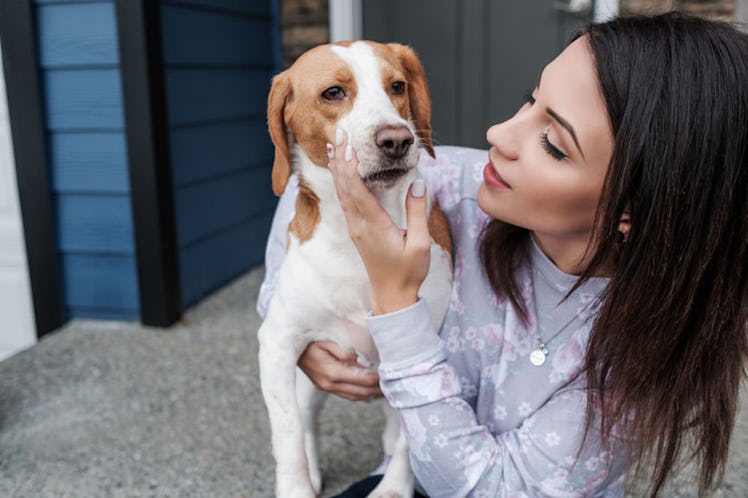
Sorry To Make Your Heart Hurt, But Your Dog Can Totally Tell When You're Sick
The moment I feel a cold creeping in or notice the back of my throat starting to get sore, I jump into full sickness-prevention mode. I drink extra water, eat lots of citrus, and try to sleep more than I usually do. Most importantly, I cuddle up with my dog so that I feel less stressed about whatever sickness might be heading my way. But can your dog actually tell when you're sick? Believe it or not, according to pet experts, it's a pretty safe bet that your sweet pup is totally aware of what's going on.
No matter what the illness is, Russell Hartstein, CDBC, CPDT-KA, a dog trainer, behavioralist, and CEO of Fun Paw Care, says your dog can definitely sense it. "A person can be sick in so many ways (emotionally, mentally, physically, etc.), but in all areas of sickness, a person's chemicals and behavior are altered or depart from a normal baseline," he tells Elite Daily over email. "A dog is finely attuned to your emotional state, behavior, and chemicals. So any changes in your constitution, your dog will pick up on immediately."
Before you get too worried about how your case of the sniffles is affecting your fur baby, rest assured that the way your dog reacts to your illness will depend on the way that you react, explains Robert Cabral, dog trainer and member of the Wag! advisory board. "Dogs will mirror your behavior, so if you are anxious, your dog will be, too. If you are lazy and calm through an illness, your dog will also be." Similarly, if you're irritable with your pup because you aren't feeling well, that could cause your dog to go into an anxious state because they can’t figure out exactly what is going on. "Remember," Cabral tells Elite Daily, "dogs will mimic your behavior."
If you're trying to soothe your pup, you might be tempted to overcompensate by trying to assure her that everything's fine, says Cabral. "Don’t baby-talk your dog through it by saying, 'It’s OK.' This will only give your dog positive reinforcement of that behavior and cause their suspicion to be heightened and more anxious." Instead, he suggests trying to speak to her in your normal voice to give her a sign that there's no reason to be worried.
Even if you're doing your best to stay totally chill, it's a good idea to keep an eye on any signs that could mean your pup can still tell what's going on. "Some signs of distress can include excessive drooling, panting or sweating, a tucked tail, yawning, ears pinned back against their head, and excessive shedding," Gary Weitzman, DVM, MPH, CAWA, president and CEO of the San Diego Humane Society and author of the Complete Guide to Pet Health, Behavior, and Happiness, tells Elite Daily. Try helping your cute canine calm down by giving her her favorite toy to play with, or offering her a tasty treat, Dr. Weitzman suggests.
As you're focusing on your own recovery, don't hesitate to check in with a vet if you have any questions about your pup's potential reactions to your illness. "If pets are feeling uneasy, they may have changes in their behavior, such as change in appetite or energy levels," Stephanie Liff, a veterinarian at Pure Paws Veterinary Care, tells Elite Daily in an email. "Oftentimes I do encourage clients to bring these dogs in for a check-up to make sure we are not missing an underlying medical issue."
Whatever you do, don't feel like you have to isolate yourself from your pup to avoid affecting her, says Dr. Weitzman. "The companionship of a dog while you’re sick is great medicine," he explains. "You’ll both feel much better just having each other."